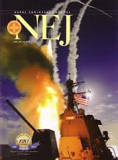
NAVAL ENGINEERS JOURNAL
Scope & Guideline
Pioneering research for the naval engineering community.
Introduction
Aims and Scopes
- Naval Warfare Technologies:
The journal emphasizes the development and testing of new technologies for naval warfare, including artificial intelligence, machine learning, and autonomous systems. This focus is critical for maintaining technological superiority in military operations. - Operational Test and Evaluation (T&E):
A core area of research involves the evaluation of naval systems and their performance in operational settings. This includes methodologies for testing and validation, ensuring that naval capabilities meet operational requirements. - Data Analytics and Decision Support:
The journal highlights the importance of data analytics in naval engineering, focusing on how data can be leveraged to support decision-making processes, optimize performance, and enhance mission effectiveness. - Sustainable Naval Engineering:
Research on sustainable practices in naval engineering, including the use of alternative fuels, energy efficiency, and environmental considerations in ship design and operation, is increasingly prominent. - Education and Workforce Development:
The journal addresses the need for educating the next generation of naval engineers, emphasizing STEM initiatives and workforce development to meet the demands of modern naval engineering.
Trending and Emerging
- Artificial Intelligence and Automation:
There is a significant uptick in research related to artificial intelligence and automation, particularly in the context of naval operations and decision-making processes. This trend is crucial as navies seek to enhance operational efficiency and effectiveness. - Digital Twins and Simulation Technologies:
The integration of digital twins and simulation technologies in naval engineering is gaining traction. These technologies enable improved design, testing, and maintenance processes, reflecting a shift towards data-driven practices. - Cybersecurity in Naval Systems:
As naval systems become more interconnected, the focus on cybersecurity has increased. Research addressing the vulnerabilities and protective measures for naval technologies is becoming increasingly relevant. - Sustainability and Green Engineering:
Emerging themes in sustainability, including the development of eco-friendly naval technologies and practices, are becoming more prevalent, reflecting a broader societal push towards environmental responsibility. - Human-Machine Teaming:
The exploration of human-machine interactions and the potential for collaboration between human operators and autonomous systems is trending, emphasizing the importance of integrating human factors in naval engineering.
Declining or Waning
- Traditional Ship Design Practices:
There is a noticeable decline in papers focused on traditional ship design techniques. As new technologies and methodologies emerge, conventional practices may be viewed as less relevant in the context of modern naval engineering. - Basic Engineering Concepts:
Research exploring fundamental engineering principles appears to be waning, as the focus shifts toward applied research that integrates advanced technologies and complex systems. - Non-Digital Manufacturing Techniques:
With the increasing emphasis on digital manufacturing processes, such as additive manufacturing and digital twins, traditional non-digital techniques are receiving less attention in recent publications.
Similar Journals

Journal of the Global Power and Propulsion Society
Exploring the Frontiers of Aerospace EngineeringJournal of the Global Power and Propulsion Society, published by GLOBAL POWER PROPULSION SOC, is a premier open-access journal established in 2017, dedicated to the dissemination of innovative research and advancements in the fields of aerospace engineering, industrial and manufacturing engineering, and mechanical engineering. Based in Zug, Switzerland, this journal provides a critical platform for researchers, professionals, and students to engage with cutting-edge studies and emerging technologies that are pivotal to the aerospace and propulsion sectors. With an impressive categorization in the Q2 quartile for multiple engineering specialties in 2023, the journal reflects its commitment to quality and rigor in its peer-reviewed articles. Moreover, it holds substantial visibility in the academic community, as evidenced by its Scopus rankings. The Journal of the Global Power and Propulsion Society stands at the intersection of innovation and collaboration, aiming to foster knowledge sharing globally while enhancing the operational capabilities of power and propulsion technologies.
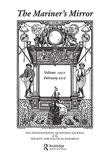
MARINERS MIRROR
Discovering the Legacy of the SeaThe Mariners Mirror, published by Routledge Journals, Taylor & Francis Ltd, is an esteemed journal dedicated to exploring the rich intersections of maritime history and oceanographic research. Since its inception in 1911, this periodical has become a vital resource for scholars and professionals alike, offering a platform for high-quality peer-reviewed articles that delve into the historical significance of maritime activities, navigation, and the evolving relationship between humans and the sea. With an ISSN of 0025-3359 and an E-ISSN of 2049-680X, the journal operates under a rigorous academic framework, contributing to its current rankings in Scopus, particularly its Q3 position in History and Q4 in Oceanography as of 2023. Although it does not offer open access, it remains influential in both disciplines, fostering a deeper understanding of our maritime heritage and the environmental challenges faced by our oceans. The Mariners Mirror is essential for researchers, professionals, and students who seek to engage with the historical narratives that shape our contemporary maritime world.
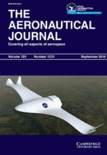
AERONAUTICAL JOURNAL
Fueling the evolution of aerospace advancements.Aeronautical Journal, published by Cambridge University Press, is a premier scholarly journal dedicated to advancing the field of aerospace engineering. With a notable impact factor, this journal holds a strong position in the academic community, ranked #53 out of 153 in the Scopus category of Aerospace Engineering, placing it in the 65th percentile. The journal has been providing a platform for groundbreaking research since its inception in 1969, and continues to be a vital resource for researchers, professionals, and students involved in aeronautics. As a Q2 journal in the 2023 Aerospace Engineering category, it offers high-quality articles that cover a range of topics within the discipline, contributing to the ongoing discourse and innovation in aerospace technologies. Although not an open-access journal, it remains accessible to a vast readership through institutional subscriptions and partnerships. The Aeronautical Journal is a crucial publication for those seeking to stay at the forefront of aerospace research and development.
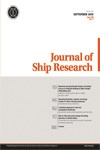
JOURNAL OF SHIP RESEARCH
Unveiling critical advancements in ocean engineering.JOURNAL OF SHIP RESEARCH is a premier publication in the field of marine engineering and naval architecture, published by the Society of Naval Architects and Marine Engineers. With a focus on advancing the science and practice of ship design and construction, this journal has become a vital resource for researchers, professionals, and students alike. The journal spans a historical range since its inception in 1969 and provides critical insights and advancements in various related disciplines, highlighted by its strong quartile rankings in Applied Mathematics and Ocean Engineering as of 2023. Although not an open-access publication, it offers valuable research papers that are influential in shaping engineering practices and methodologies across the globe. With an ISSN of 0022-4502 and an E-ISSN of 1542-0604, the journal is available to a broad audience, providing essential knowledge that bridges theory and practical applications in the evolving maritime domain.

Informatics-Basel
Exploring New Frontiers in Computer NetworksInformatics-Basel is a leading international, peer-reviewed journal published by MDPI that has been at the forefront of disseminating high-quality research in the field of informatics since its establishment in 2014. Based in Switzerland, this Open Access journal strives to provide a platform for innovative studies across various domains, including Communication, Computer Networks and Communications, and Human-Computer Interaction, demonstrating its strong impact within these fields with impressive rankings: Q1 in Communication and Q2 in both Computer Networks and Communications and Human-Computer Interaction. Researchers and scholars are encouraged to contribute to the advancing dialogue on critical issues and emerging technologies, as evidenced by its esteemed Scopus rankings, placing it in the top percentiles of its respective categories. With its commitment to elevating knowledge accessibility, Informatics-Basel has become an essential resource for the academic community, stimulating collaboration and the sharing of ideas from 2014 to 2024 and beyond.

Flexible Services and Manufacturing Journal
Enhancing Operational Dynamics through Rigorous ScholarshipFlexible Services and Manufacturing Journal is a pivotal publication in the fields of Industrial and Manufacturing Engineering as well as Management Science and Operations Research, renowned for its rigorous approach to advancing the intersection of service and manufacturing domains. Published by Springer, this journal boasts a commendable impact factor and ranks in the top quartiles, signifying its position among the leading academic outlets in its categories. With a broad scope that encompasses innovative methodologies, case studies, and empirical research, it aims to foster dialogue and understanding among researchers and practitioners alike. The journal invites contributions that advance theory and practice, as well as interdisciplinary perspectives that enhance the operational dynamics of both industries. Since its inception in 2006, Flexible Services and Manufacturing Journal has emerged as a critical resource for those looking to explore the complexities of flexible service delivery and manufacturing processes, establishing itself as essential reading for academics, industry professionals, and students pursuing cutting-edge research.

NAVAL RESEARCH LOGISTICS
Navigating the Future of Maritime LogisticsNAVAL RESEARCH LOGISTICS is a prestigious scholarly journal, published by WILEY, that serves as a vital platform for researchers and professionals in the fields of management science, operations research, ocean engineering, mathematics, and modeling and simulation. With an impressive impact factor and recognized as a Q1 journal in its respective categories, it reflects the highest standards of quality and rigor in research dissemination. Covering discussions from its inception in 1973 to the present, NAVAL RESEARCH LOGISTICS addresses key issues and innovations in logistics and operational challenges, particularly within the naval context, thus making significant contributions to policy and strategic decision-making. The journal is not currently available as an open-access publication, yet it provides rich insights essential for academics, industry experts, and students keen on advancing their knowledge in logistics and operations related to maritime applications. With a commitment to bridging theory and practice, this journal is an indispensable resource for anyone connected to the maritime logistics field.
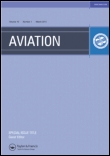
Aviation
Connecting scholars and innovators in aviation.Aviation, published by Vilnius Gediminas Technical University, is a leading open-access journal dedicated to the dynamic field of aerospace engineering, with an ISSN of 1648-7788 and E-ISSN of 1822-4180. Established in 2004 and set to converge in 2024, this journal aims to disseminate high-quality research that advances the understanding and application of aerospace technology. With an impact factor reflective of its contribution to the discipline, Aviation ranks at Q4 in the Aerospace Engineering category and occupies the 80th position out of 153 in Scopus, highlighting its growing significance among scholarly publications. By providing free access to its content since 2018, the journal enhances its reach and encourages collaborative efforts in the academic community, catering to researchers, professionals, and students eager to explore innovative studies and findings within aerospace engineering. Based in Lithuania, this journal serves as a vital resource for those aiming to contribute to the future of aviation.
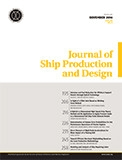
Journal of Ship Production and Design
Advancing innovation in shipbuilding and marine engineering.Journal of Ship Production and Design is an esteemed publication dedicated to advancing the fields of shipbuilding and marine engineering. Published by the SOC Naval Architects & Marine Engineers in the United States, this journal serves as a vital platform for sharing innovative research and developments in mechanical and ocean engineering. With an ISSN of 2158-2866 and an E-ISSN of 2158-2874, the journal covers a wide spectrum of topics relevant to ship production, design methodologies, and advancements in materials and technologies used in marine applications. Although it currently operates without open access, the journal has established itself in the academic community, reflected by its rankings in Scopus and various quartiles in 2023, demonstrating its relevance and contribution to engineering disciplines. Since its inception in 2013, the Journal of Ship Production and Design has played a crucial role in disseminating knowledge, fostering collaboration, and inspiring the next generation of engineers and researchers in increasingly competitive fields.
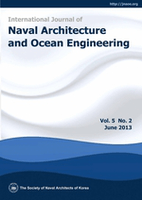
International Journal of Naval Architecture and Ocean Engineering
Empowering the maritime community with unrestricted access to knowledge.International Journal of Naval Architecture and Ocean Engineering is a premier academic journal dedicated to advancing the fields of naval architecture and ocean engineering. Published by the SOC NAVAL ARCHITECTS KOREA, this Open Access journal has been a vital resource for researchers and industry professionals since its founding in 2009, providing unrestricted access to high-quality, peer-reviewed articles. With a notable Q2 ranking in both Control and Systems Engineering and Ocean Engineering, it ranks among the top journals in its category, offering valuable insights into emerging technologies and methodologies. The journal’s reputation is further highlighted by its Scopus rankings, positioning it within the top 30% of journals in Ocean Engineering and the top 31% in Control and Systems Engineering as of 2023. Based in the vibrant academic hub of Seoul, South Korea, the journal invites manuscripts that explore innovative solutions and critical research to address the challenges in naval and oceanic environments, contributing to the global dialogue on sustainable maritime practices.